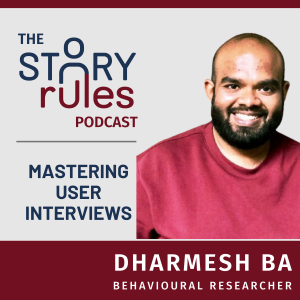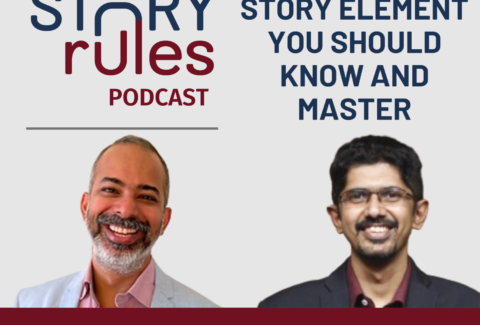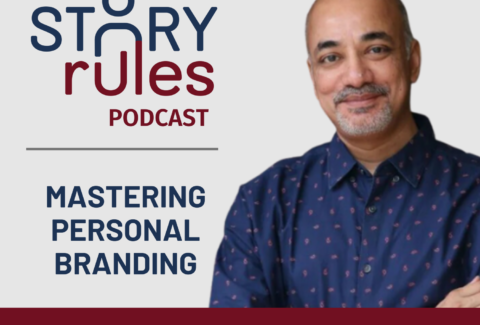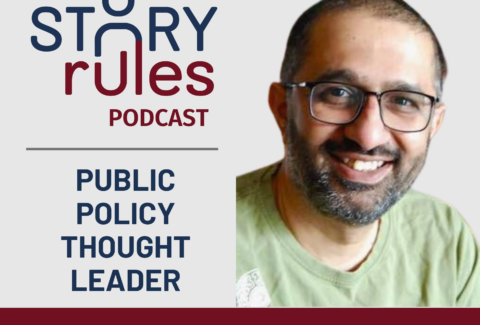A vocab cheat-sheet for your data story
What is wrong with the below slide* (apart from the poor resolution)?
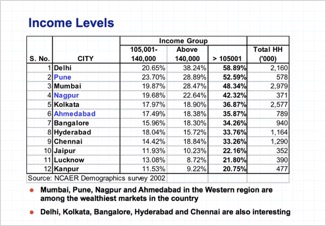
Everything right?!
Let’s start with the most glaring issue – it has no ‘message’ on top. A neutral header (‘Income levels’) does nothing to tell the audience what the slide is actually saying.
Now, in a previous post, we have seen the importance of crafting clear, surprising messages from your data. Messages that get the audience’s attention, using the principle of norm and variance.
When you attempt to do this, however, you may get stuck at the next hurdle: choosing the right adjectives.
Adjectives? Do you mean like ‘good’, ‘bad’ and ‘ugly’? Well… yes, but slightly more nuanced. Consider the following messages – especially the italicised adjectives:
- Sales have shown whopping growth (whopping – too dramatic)
- Our performance has been super impressive (too informal for a corporate presentation)
- Attrition rates have been bad (Really? ‘Bad’? That’s really nuanced…)
The issue here is that we tend to gravitate between two extremes when it comes to choosing such adjectives:
- We use a small set of ‘standard/banal’ words to describe these metrics (e.g. revenue went up, NPS is the same as last quarter, profitability is lower than competitors etc.), or
- We go for dramatic words, that may work in informal settings or in news headlines (tremendous, super-high, the pits etc.), but aren’t appropriate in a formal corporate setting^.
What we end up doing is essentially use a very limited vocabulary for a very wide range of performance phenomena.
Wouldn’t it be good to have a readymade list of potential words, to choose from, to describe various performance scenarios?
A bit like that scene in The Matrix, when Keanu Reeves is asked what does he need for the final fight… and he says – “Guns, lots of guns”… Immediately he’s in this cavernous room filled from floor to ceiling with every kind of firearm imaginable.
(I know – even I wanted to watch that scene again, after writing this. Here you go:
What. A. Swag.)
Imagine saying “Words, lots of words”, and having a rich collection of words to choose from…
The Descriptive Words Cheat Sheet
Presenting the ‘Descriptive Words Cheat Sheet’ – a ready reference guide for you to choose from, based on two factors inherent in your message from the data:
- The type of comparison factor in your message
- The intensity of the performance difference (low, medium, high)
What do I mean by comparison factor? Well, there are three basic types of comparisons we can do with data – over time, across other items (competition, internal teams etc.) and as a component (share) of something.
Here’s a quick overview with examples.
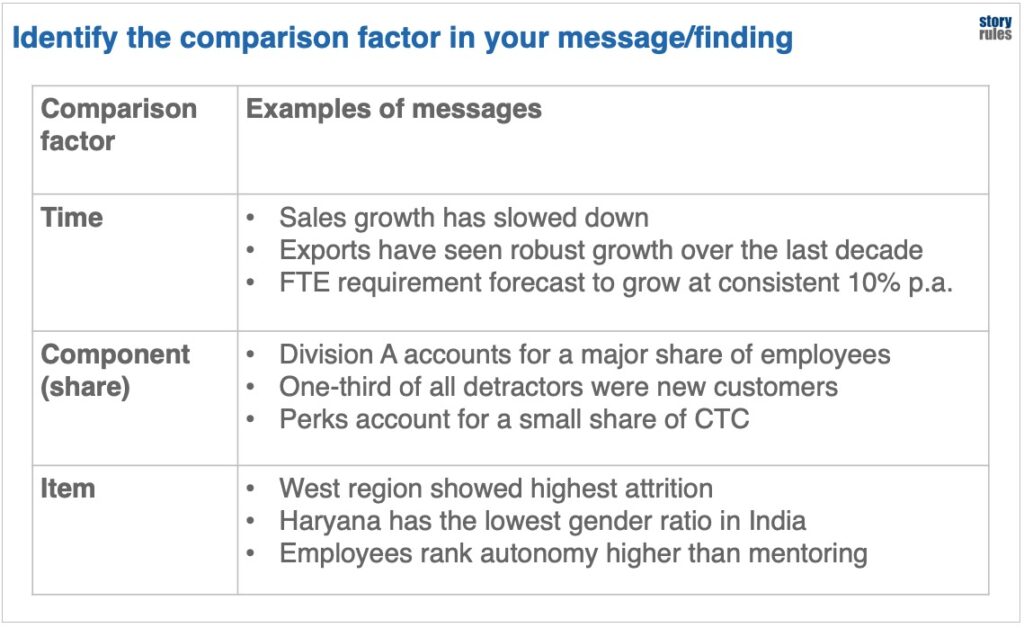
So then, based on the comparison factor and the intensity of the change, presenting ‘The Descriptive Words Cheat Sheet’ – a set of words you can choose from, to describe your key finding:
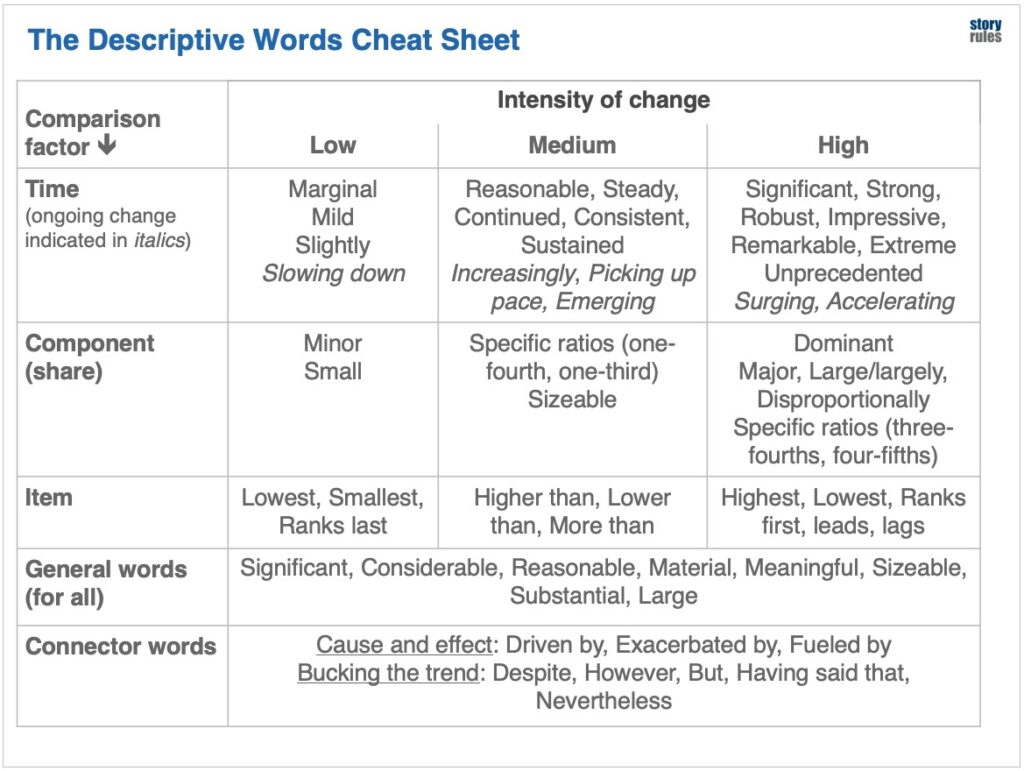
Useful no?
Now, a couple of disclaimers for the above:
- The comparison factors can be more complex (you could be looking at more than one factor – such as increasing share over time). Use your judgement in such cases.
- Also, this is clearly not a comprehensive list of words – feel free to keep adding to the list.
If you’d like a PDF copy of this to print and stick on your soft-board, I’m happy to share the same. Please drop me an email at ravishankar@storyrules.in. (sneaky, huh?)
Happy describing!
*****
* Incidentally this is a slide from my first presentation during my consulting years… Let’s just say I’m happy I started rock-bottom – the only way was up.
^ A disclaimer – formal corporate setting doesn’t mean the use of stifling jargon and generic corporate-speak such as ‘synergistic’, ‘value-addition’ and ‘paradigm-shift’. The idea is to use simple, plain English words… without veering into informal, street-lingo, especially when dealing with clients. It’s a fine balance!
Featured image by Pisit Heng on Unsplash



